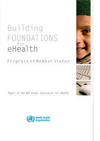 Report of the WHO Global Observatory for eHealth
Report of the WHO Global Observatory for eHealthThe latest report from the Global Observatory for eHealth, entitled "Building Foundations for eHealth" will be officially launched at two parallel events. The first in Bangkok, Thailand, during the Prince Mahidol Award Conference, and the second at the headquarters of the World Health Organization in Geneva, Switzerland.
Every day, across the world, people make improvements in health as a direct benefi t of information and communication technologies (ICT). eHealth innovations like electronic health records, computerassisted prescription systems and clinical databases are transforming health today, and hold even greater promise for the future. ICT support clinical care, provide health information to the general public and scientifi c information to professionals. They provide a platform for publishing, disseminating health alerts and supporting administrative functions.
The World Health Organization's (WHO) strategy on eHealth focuses on strengthening health systems in countries; fostering public-private partnerships in ICT research and development for health; supporting capacity building for eHealth application in Member States; and the development and use of norms and standards. Success in these areas is predicated on a fi fth strategic direction: investigating, documenting and analysing the impact of eHealth and promoting better understanding by disseminating information.
To that end, WHO undertook a global survey on eHealth with which to garner baseline data on the current state of eHealth. Executed between mid-2005 and mid-2006, it represents the fi rst attempt to examine eHealth from a regional as well as global perspective. Developed and implemented by the Global Observatory for eHealth (GOe), the survey focused on processes and outcomes in key eHealth action lines previously identifi ed by the World Summit for the Information Society (WSIS),1 which are supported by WHO as an overall framework for action.
Given this survey was the fi rst of its kind the Observatory was greatly encouraged by the number of Member States that responded. Over 700 informants from 112 countries provided their expert knowledge (nearly 60% of the 192 WHO Member States,2 representing approximately 80% of the worlds population).
For further information, please visit:
WHO Global Observatory for eHealth (GOe)
Download "Building Foundations for eHealth" (pdf 11.96Mb)